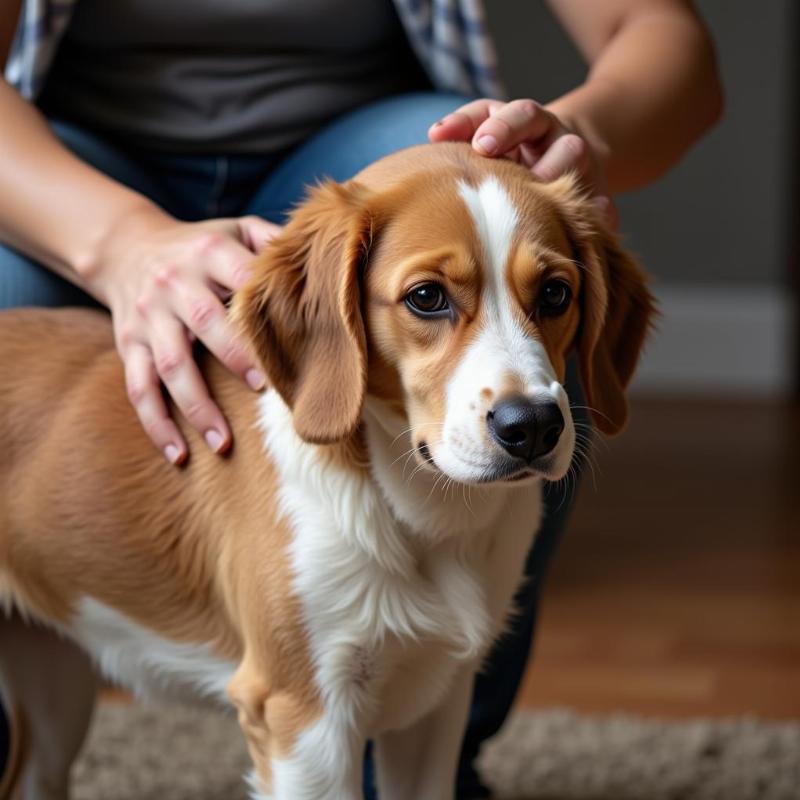Heavy panting in dogs can be concerning for owners. While some panting is normal, especially after exercise or in hot weather, excessive panting can indicate a serious underlying issue. Understanding what causes heavy panting in dogs is crucial for providing appropriate care and ensuring your furry friend’s well-being. This article will explore the various reasons behind heavy panting in dogs, ranging from benign causes to more serious medical conditions, and guide you on when it’s time to seek veterinary attention.
Decoding Dog Pants: Normal vs. Excessive
Dogs don’t sweat like humans; they primarily regulate their body temperature through panting. Normal panting is characterized by rhythmic, shallow breaths with their tongue slightly out. This is typically seen after physical activity, on a warm day, or during periods of excitement. However, heavy panting is different. It’s often more rapid, deeper, and accompanied by other symptoms like distress, restlessness, or changes in gum color. This type of panting warrants closer attention.
Common Causes of Heavy Panting in Dogs
Several factors can contribute to heavy panting in dogs. Some are easily addressed, while others require veterinary intervention.
Heatstroke: A Serious Threat
Heatstroke is a life-threatening condition that can cause heavy panting, rapid pulse, weakness, vomiting, and even collapse. Never leave your dog in a parked car, even on a mildly warm day. Always ensure access to shade and fresh water, especially during summer.
Pain and Discomfort
Pain from injuries, infections, or chronic conditions can trigger heavy panting. If your dog is panting excessively and exhibits signs of pain, such as limping or whining, consult your veterinarian immediately.
Anxiety and Stress
Just like humans, dogs experience anxiety and stress. Loud noises, separation anxiety, or new environments can lead to heavy panting. Creating a calm and reassuring environment can help alleviate anxiety-related panting.
Respiratory Issues
Underlying respiratory problems like asthma, pneumonia, or heart disease can manifest as heavy panting. These conditions require prompt veterinary diagnosis and treatment.
Medications
Certain medications, such as steroids, can cause increased panting as a side effect. If you notice changes in your dog’s breathing after starting a new medication, contact your veterinarian.
When to Seek Veterinary Care
If your dog’s panting seems excessive or is accompanied by other symptoms like:
- Changes in gum color (pale, blue, or bright red): This can indicate a lack of oxygen.
- Weakness or collapse: These are signs of a serious medical emergency.
- Vomiting or diarrhea: These can accompany heatstroke or other illnesses.
- Difficulty breathing: This suggests a respiratory problem.
- Increased salivation or drooling: This can be a sign of poisoning or nausea.
…then it’s crucial to seek immediate veterinary attention.
Tips for Managing Heavy Panting at Home
While veterinary care is essential for diagnosing and treating underlying medical conditions, there are steps you can take at home to help manage your dog’s panting in certain situations:
- Provide cool water and shade: Especially during hot weather.
- Create a calm environment: Minimize stressors like loud noises or unfamiliar situations.
- Use cooling aids: Cooling mats, vests, or even a wet towel can help regulate your dog’s body temperature.
- Engage in calming activities: Gentle petting, massage, or quiet playtime can help reduce anxiety.
 Owner comforting a scared dog
Owner comforting a scared dog
A Veterinarian’s Perspective
“Heavy panting is often a dog’s way of communicating discomfort or distress,” says Dr. Emily Carter, DVM, a veterinarian specializing in canine respiratory health in Austin, Texas. “While it can sometimes be a simple response to heat or excitement, it’s important to pay attention to the context and any accompanying symptoms. Early diagnosis and treatment are key to managing underlying medical conditions and ensuring your dog’s well-being.”
Conclusion
Heavy panting in dogs can be a sign of various underlying issues, from heatstroke and pain to anxiety and respiratory problems. Understanding the potential causes and recognizing when to seek veterinary care is crucial for responsible dog ownership. By observing your dog’s behavior and providing appropriate care, you can ensure their health and happiness for years to come. If you are ever concerned about your dog’s panting, don’t hesitate to contact your veterinarian.
FAQ
- Is it normal for my dog to pant after exercise? Yes, panting is a normal way for dogs to regulate their body temperature after physical activity.
- How can I tell if my dog’s panting is excessive? Excessive panting is often rapid, deep, and accompanied by other symptoms like distress or changes in gum color.
- What should I do if my dog is panting heavily and seems distressed? Seek immediate veterinary attention.
- Can anxiety cause heavy panting in dogs? Yes, anxiety and stress can trigger heavy panting.
- What are the signs of heatstroke in dogs? Heavy panting, rapid pulse, weakness, vomiting, and collapse are signs of heatstroke.
- How can I prevent heatstroke in my dog? Never leave your dog in a parked car, provide access to shade and fresh water, and avoid strenuous exercise during hot weather.
- What are some common respiratory problems that can cause heavy panting? Asthma, pneumonia, and heart disease can cause heavy panting.
Related Articles:
- dog stops walking and won’t move
- harness for 3 legged dog
- help em up dog harness
- back leg support harness for dogs
About Beautdogs.us:
Beautdogs.us is your premier online resource for comprehensive dog care information, breed-specific guidance, and access to the best products for your canine companion. Whether you’re a seasoned dog owner or just starting your journey with a furry friend, we provide expert advice and resources to help you navigate every aspect of dog ownership. From understanding your dog’s unique needs to finding the perfect products and services, Beautdogs.us is here to support you. Contact us today for personalized assistance at [email protected] or call us at +1 501-555-7529.